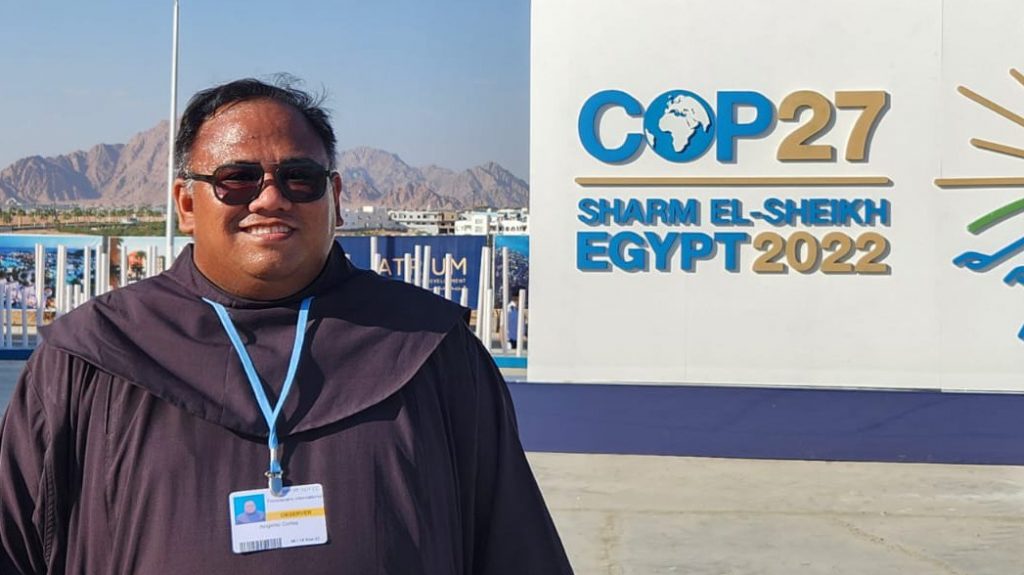Catholic groups at the U.N. climate conference said they were disappointed that, in the meeting's opening days, few world leaders demonstrated progress in implementing their climate commitments or financial support for countries bearing the brunt of climate change.
"The leaders have started giving speeches, but no one is talking about what we want to hear," said Roman Sieler, European co-president of FIMCAP, an umbrella association for Catholic youth organizations. "We want implementation and compensation for the damage and loss caused by severe climate change."
"We want action," he added. "There has been severe loss and damage that has affected many people, and that's why we are here, to push this agenda as Catholic youths."
During the opening ceremony of COP27, as the conference is known, more than 100 world leaders gathered to push for full implementation of the Paris Agreement, a legally binding international treaty that took effect in November 2016. This year's gathering is taking place against the backdrop of inadequate action to curb greenhouse gas emissions.
The U.N. Intergovernmental Panel on Climate Change says carbon emissions need to be cut by 45% by 2030, compared to 2010 levels, to meet the central Paris Agreement goal of limiting temperature increase to 1.5 degrees Celsius by the end of this century.
Catholic groups told EarthBeat, the environmental project of the U.S.-based National Catholic Reporter, that world leaders do not seem ready to implement the Paris Agreement and work together to tackle the global challenge of climate change unless they are begged to do so.
"Climate change is a real disaster that is really weighing in on us. As youths, we are worried that we may lose our planet if we are not careful," warned McIvan Vamboi, national president of the Catholic Youth Organization in Sierra Leone. "We have also to push the question of what else after COP27. I know that they will still hold another COP28 next year in Dubai. But the question is, are we achieving the goals?"
He said he thought key issues being raised by churches, nongovernmental organizations, civil societies and some governments could still be achieved if people put aside their differences and worked together to save the planet.
Many Catholic advocates said they started to become worried Nov. 6, when delegates struggled to reach an agreement on the discussion of loss and damage, resulting in the delay of the start of the climate summit.
Delegates spent hours deliberating on how "loss and damage" -- which refers to the devastating consequences of climate change suffered by the poorest and most vulnerable countries, and how to help or compensate them -- should be put on the agenda.
"We are worried that we may not get what we want from this COP27 because our leaders still want to discuss issues affecting people instead of implementing them," said Father Angelito Andig Cortez from the Philippines, representing the Franciscan delegation at COP27. "However, we must support all civil society organizations and church actors as they advocate and act for climate justice and demand that our leaders build efforts to engage people directly working on and directly impacted by climate change."
Some Catholic aid and development groups attending the conference still believe it's not too late to push the voices of vulnerable communities around the globe to the front line of the climate crisis.
"It will be an opportunity to advocate for climate justice and bring to the world's attention the conditions of vulnerable communities and their sufferings as a result of climate change, even though they are not directly responsible for it," Aloysius John, secretary-general of Caritas Internationalis, said in a statement Nov. 6. "Climate change has had a major impact on the current food and migration crisis. The international community and, especially the states responsible for the degradation of our common home, must act immediately."
Caritas Internationalis, the humanitarian and development organization of the Catholic Church, said it would push for the inclusion of loss and damage to ensure wealthy nations responsible for the largest share of greenhouse gas emissions compensate climate-vulnerable nations.
"Without a reliable and comprehensive financing facility to ensure funding to help countries cope with climate-induced loss and damage, the most vulnerable countries will sink deeper into debt and poverty every time they are hit by climate disasters, for which they are not responsible," added John.
On Nov. 8, Austria announced it would direct 50 million euros to fund loss and damage. Scotland, which last year at COP26 in Glasgow became the first country to pledge financial assistance on loss and damage, also committed an additional 5 million euros to its initial pledge. Belgium, Denmark and Germany also have pledged support.

